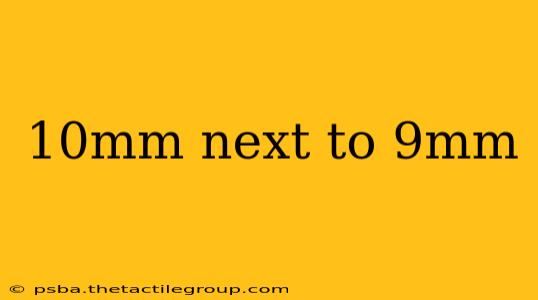Choosing the right caliber for your handgun is a crucial decision, impacting everything from accuracy and stopping power to recoil and ammunition cost. This in-depth comparison of 10mm and 9mm cartridges aims to clarify the key differences and help you determine which is the better fit for your needs.
Understanding the Basics: 10mm Auto and 9x19mm Parabellum
Before diving into the specifics, let's establish the foundational characteristics of each caliber.
-
10mm Auto: Developed by Jeff Cooper and introduced by Colt in 1983, the 10mm Auto is a powerful cartridge designed for both personal defense and hunting. Its larger diameter and heavier bullet result in significantly more stopping power than the 9mm.
-
9x19mm Parabellum (9mm): One of the world's most popular handgun cartridges, the 9mm Parabellum is known for its balance of manageable recoil, high capacity magazines, and relatively low cost. Its widespread adoption makes it readily available and easily accessible.
Key Differences: A Head-to-Head Comparison
This table summarizes the core differences between 10mm and 9mm:
| Feature | 10mm Auto | 9x19mm Parabellum (9mm) |
|---|---|---|
| Caliber | 10mm | 9mm |
| Bullet Diameter | 10mm (.394 inches) | 9mm (.355 inches) |
| Case Length | Longer | Shorter |
| Stopping Power | Significantly Higher | Lower |
| Recoil | Higher | Lower |
| Accuracy | Generally Good, but can vary with load | Generally Excellent, even with lower-cost ammo |
| Ammunition Cost | Typically Higher | Lower |
| Availability | Widely Available, but not as common as 9mm | Extremely Widely Available |
Stopping Power and Recoil: The Crucial Trade-Off
The most significant difference lies in stopping power and recoil. The 10mm's larger bullet and higher velocity deliver considerably more energy upon impact, potentially leading to a quicker incapacitation of a target. However, this power comes at a cost – the 10mm exhibits noticeably stronger recoil. This can be challenging for shooters with less experience or smaller frames, potentially leading to faster fatigue and reduced accuracy.
The 9mm, on the other hand, provides a more manageable recoil, allowing for faster follow-up shots and improved accuracy, particularly during stressful situations. While its stopping power is lower than the 10mm, advancements in bullet technology have significantly improved its effectiveness.
Accuracy and Practical Considerations
Both calibers are capable of impressive accuracy, but factors such as ammunition quality and shooter skill play significant roles. The 9mm's widespread popularity and extensive ammunition selection often contribute to higher accuracy rates for average shooters due to the availability of consistently high-quality ammunition. However, premium 10mm ammunition can also deliver exceptional accuracy.
Beyond accuracy, the 9mm’s greater availability and lower cost make it the more practical choice for many. This is particularly true for range practice and high-volume shooting.
Which Caliber is Right for You?
The "better" caliber ultimately depends on individual needs and priorities.
-
Choose 10mm if:
- You prioritize maximum stopping power.
- You're comfortable with higher recoil.
- You're engaging in hunting or situations requiring maximum penetration.
-
Choose 9mm if:
- You prioritize manageable recoil and ease of shooting.
- You want readily available and affordable ammunition.
- You need a high-capacity magazine for self-defense.
This comparison provides a comprehensive overview of 10mm and 9mm pistol cartridges. Ultimately, the best choice hinges on a careful consideration of your individual needs, experience level, and intended use. Consulting with experienced shooters and firearms professionals can offer further guidance.

